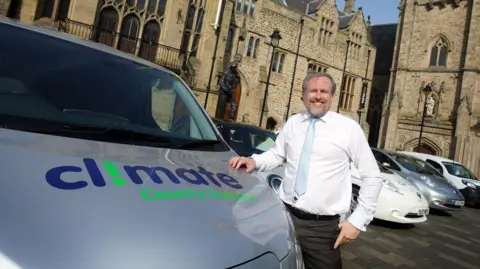
A council which has cut its annual carbon footprint by 50,000 tonnes over 15 years has won an environmental award.
Durham County Council scooped the Best Carbon Reduction prize at the Investors in Environment Awards for its efforts.
Much of its reduction is down to the use of green technology such as wind turbines, solar panels and battery storage.
Councillor Mark Wilkes said the council’s green projects allowed it to “save money and save carbon”.
A large part of the reduction has been achieved by switching its buildings to renewable energy, some of which is produced using the council’s own infrastructure.
“A lot of our schools, depots, leisure centres are switching over to air source heat pumps,” said Wilkes.
“We are installing solar panels on to the roofs of our buildings and we have wind turbines going in at one of our depots down in Peterlee.”

The council has also built a 3MW solar farm at its depot in Annfield Plain, from where excess energy is sold back into the grid.
Having its own green energy source has also allowed the council to operate more electric vehicles.
“Being able to charge up those vehicles with the energy we are producing in the county is having a really important impact on the bottom line financially, but also on tackling carbon emissions,” said Wilkes.
Durham County Council’s carbon footprint has fallen from 80,523 tonnes in 2008-09 to 29,173 in 2023-24, with an aim of net zero by the end of the decade.
The local authority recently adopted its third Climate Emergency Response Plan, which will run until 2027.
As the world grapples with climate change, energy security, and the depletion of fossil fuel reserves, the transition to renewable energy has become a necessity. Renewable energy sources such as solar, wind, hydro, geothermal, and biomass offer numerous advantages over traditional fossil fuels. From environmental benefits to economic growth, renewable energy is shaping a cleaner, more sustainable future.
1. Environmental Benefits
Reduction in Greenhouse Gas Emissions
One of the most significant advantages of renewable energy is its ability to reduce greenhouse gas emissions. Fossil fuels like coal, oil, and natural gas release large amounts of carbon dioxide (CO₂) and other harmful pollutants into the atmosphere, contributing to global warming. In contrast, renewable energy sources generate power with little to no emissions, helping combat climate change.
Improved Air and Water Quality
Burning fossil fuels releases pollutants such as sulfur dioxide, nitrogen oxides, and particulate matter, which contribute to smog and respiratory diseases. Renewable energy sources, particularly wind and solar power, do not produce these pollutants, leading to cleaner air. Additionally, fossil fuel extraction and processing often contaminate water sources, whereas renewables require minimal or no water use, preserving freshwater resources.
Reduced Dependence on Finite Resources
Fossil fuels are finite and will eventually be depleted. Their extraction is also environmentally destructive, leading to deforestation, habitat loss, and oil spills. Renewable energy sources, on the other hand, are naturally replenished and provide a continuous supply of energy without harming ecosystems.
2. Economic Benefits
Job Creation and Economic Growth
The renewable energy sector is a major driver of job creation. According to the International Renewable Energy Agency (IRENA), the industry employs millions of people worldwide, with job opportunities in manufacturing, installation, maintenance, and research. Countries investing in renewables experience economic growth and energy independence, reducing reliance on expensive fossil fuel imports.
Energy Cost Savings
While the initial investment in renewable energy infrastructure can be high, the long-term savings are substantial. Solar and wind power, for example, have lower operational and maintenance costs compared to fossil fuel-based power plants. With advancements in technology and increased production, the cost of renewable energy continues to decline, making it more affordable for businesses and households.
Energy Security and Price Stability
Fossil fuel prices are highly volatile due to geopolitical tensions and supply chain disruptions. In contrast, renewable energy relies on local resources, reducing dependence on foreign energy supplies and stabilizing energy prices. This energy security is crucial for national economies and businesses, ensuring a stable and predictable energy market.
3. Social and Health Benefits
Energy Access for All
Renewable energy plays a crucial role in providing electricity to remote and underserved areas. Millions of people worldwide still lack access to reliable electricity, which affects education, healthcare, and economic opportunities. Off-grid solar and wind solutions offer an affordable and sustainable way to bring power to rural communities, improving living standards.
Health Improvements
Reducing air pollution from fossil fuels leads to better public health. Respiratory diseases, cardiovascular conditions, and premature deaths linked to pollution can be significantly reduced by transitioning to clean energy sources. Lower healthcare costs and improved quality of life are direct benefits of reducing dependence on polluting energy sources.
4. Technological Advancements and Innovation
Advancements in Storage and Grid Integration
One of the challenges of renewable energy has been its intermittency—solar power is generated only during the day, and wind energy depends on wind conditions. However, advancements in battery storage technology and smart grid systems are improving energy reliability. Large-scale energy storage solutions allow excess energy to be stored and used when needed, ensuring a steady power supply.
Development of Green Hydrogen
Green hydrogen, produced using renewable energy, has the potential to revolutionize industries that rely on fossil fuels, such as transportation and heavy manufacturing. As technology advances, hydrogen fuel cells could become a mainstream energy solution, reducing carbon emissions even further.
5. Climate Resilience and Future Sustainability
Mitigating Climate Change
The effects of climate change, such as extreme weather events, rising sea levels, and heatwaves, are becoming more severe. By reducing carbon emissions, renewable energy helps slow down climate change, protecting communities and ecosystems. Investing in renewables is a proactive step toward a more resilient and sustainable planet.
Encouraging Sustainable Development
Renewable energy aligns with global sustainability goals, such as the United Nations’ Sustainable Development Goals (SDGs). It promotes responsible consumption, reduces environmental degradation, and fosters a circular economy where resources are used efficiently and sustainably.
Conclusion
The benefits of renewable energy are undeniable. From reducing carbon emissions and improving public health to creating jobs and ensuring energy security, renewables offer a path toward a cleaner, more sustainable future. Governments, businesses, and individuals must continue investing in renewable energy solutions to combat climate change, boost economic growth, and provide clean energy for future generations. The transition to renewables is not just an option—it is a necessity for a better world.